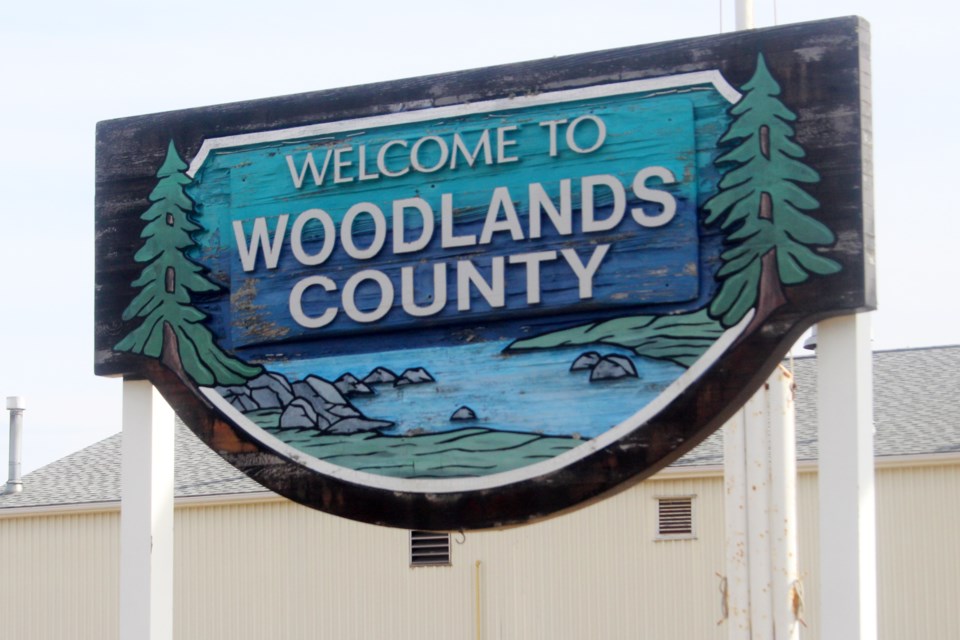An aggregate crushing tender where the lowest bid was 23.5 per cent over what Woodlands County had budgeted for prompted a lengthy discussion last week about the process of developing a capital budget and how the county would cover the extra cost.
Woodlands County councillors begrudgingly passed a motion at their Feb. 2 meeting to award a tender for aggregate crushing at the 2022 CN Pit to Associated Aggregate at a cost of $926,750 plus taxes — a full $176,750 beyond what the county had budgeted.
However, councillors also passed a motion directing administration to review the 2022 capital budget and prepare a report on any major variances that might be tied to inflation, along with another motion to discuss the county’s procurement policy at an upcoming Governance and Procedures meeting.
As outlined in a report by director of infrastructure Andre Bachand, Woodlands County owns and operates a number of gravel pits that supplies the gravel the municipality spreads on local roads.
The county contracts out crushing operations on a rotating three-year basis, each time using a different pit. A total of $750,000 was budgeted for this year’s crushing operation.
A tender was let out and the county received a total of six bids, with the lowest bid coming from Associated Aggregate at the cost of $926,750. (Incidentally, the remaining bids ranged from $1.028 million to $1.387 million.)
Bachand said the contractor was willing to reduce the amount of aggregate crushed over the next three years to match the $750,000 allotted in the budget.
“However, given that aggregate is the main feature on our roads and probably the most important thing we put down, administration is recommending that the project be awarded to Associated Aggregate at $926,750 (plus tax) and that the capital budget be amended when the final budget amendments are done later this year,” he said.
Coun. Peter Kuelken asked how administration came up with the original estimate of $750,000, noting that they only approved the capital budget roughly a month and a half to two months ago.
Bachand said that figure was based on their last crushing operation at the Cemtery Pit near Fort Assiniboine, which cost the county approximately $700,000. (They had even added $50,000 to account for inflation, he noted.)
Coun. Bruce Prestidge asked if it would be possible to put out a tender prior to the capital budget being finalized so that council had a better idea of the costs. Bachand indicated they could do that moving forward.
Coun. Kusch asked how the county’s road maintenance would be impacted if they indeed reduced the amount of aggregate crushing to match the $750,000 budget.
Bachand said it wouldn’t have a huge impact on road maintenance, but it would effectively leave the county without any gravel after three years; normally, they would have some aggregate left as a back-up.
Kusch ultimately put forward the motion to award the tender at the quoted price to Associated Aggregate, noting that roads are the primary infrastructure the county must maintain.
“I don’t want to be in a position where we run out of gravel,” he said.
Coun. Devin Williams said he agreed with Kusch’s point about road maintenance being their most important responsibility, but asked if the county was putting the cart before the horse by awarding this tender without knowing where the extra money would come from.
Coun. Jeremy Wilhelm added that it was really hard to vote for this extra cost to be added to the budget without knowing how it would be covered.
“That is a huge cost increase. What are we cutting to make that happen?”
CAO Gordon Frank said the county receives its assessment figures in the middle of March and generally adjusts its budgets based on what they expect to collect from taxation.
Depending on how much revenue the county collects, he suggested that some capital projects could be postponed, or they may be able to adjust the allowance for uncollectable taxes given the turnaround in the oil and gas industry.
Mayor John Burrows, who joined the meeting late in the discussion, said this cost increase was why he advised estimating on the high side when writing the capital budget.
“This is a very different time right now,” he said, noting that council had to be prepared for other high costs coming across the board.
After council passed the motion to accept the tender, Burrows put forward the motion directing administration to re-examine the capital budget, while Prestidge put forward the motion to review the council’s procurement policy, which guides administration in tendering out capital projects like this one.



